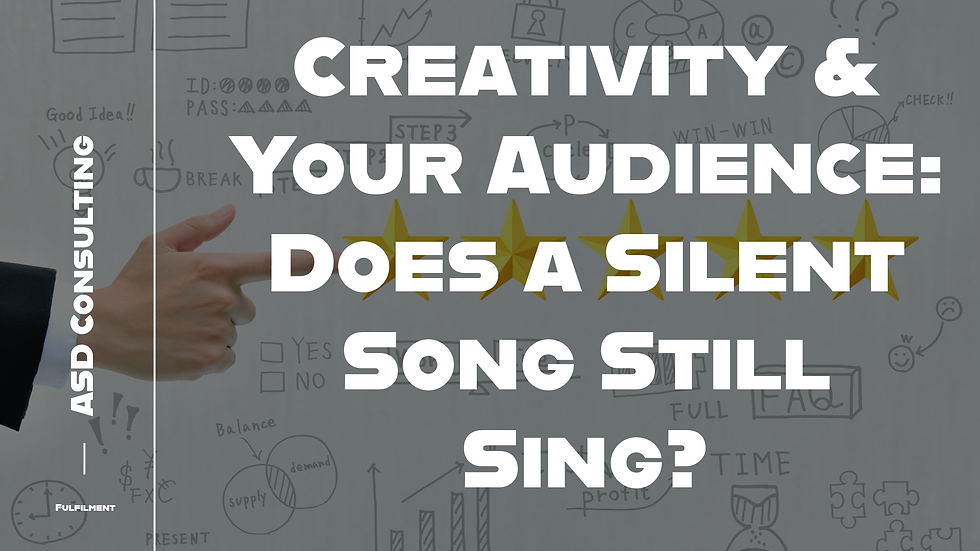The Algorithmic Smile: Is the Pursuit of Happiness a Marketing Ploy, and Does Fulfilment Threaten the Machine?
- David Tyler

- May 10
- 5 min read
Updated: May 19

I often find myself contemplating the fundamental drivers of human action and societal structure. We are told, in myriad ways, that the ultimate aim is happiness. From ancient philosophical treatises to self-help bestsellers and ubiquitous advertising slogans, happiness is presented as the summum bonum, the highest good. But let us pause and engage in a moment of critical reflection: Is this relentless striving for happiness a truly inherent human quest, or has it been deliberately shaped, perhaps even constructed, by powerful forces within our society? Specifically, is the marketing industry, in its insatiable drive to fuel consumerism, using the ideal of happiness to keep us working hard and, implicitly, under control? And if so, what does this imply for the pursuit of genuine fulfilment?
The marketing industry is a titan of modern influence, wielding sophisticated psychological tools to understand and shape human desire. Its fundamental objective is to sell goods and services, and it achieves this not merely by highlighting utility, but by associating products with aspirational states – chief among them, happiness. Advertisements rarely sell just a car; they sell the freedom and joy of the open road. They don't just sell a watch; they sell success and sophistication, implying these lead to a happier life.
Through this constant barrage of carefully curated messages, a powerful societal narrative is constructed: happiness is attainable, and its pathway is paved with consumption. We are subtly, or sometimes not so subtly, taught that the latest gadget, the trendiest fashion, the exotic holiday, or the perfect home renovation will bring us closer to that coveted state of bliss.
This manufactured link between consumption and happiness serves a crucial function for the economic system, particularly capitalism. By equating happiness with material acquisition, the marketing industry creates a perpetual cycle of desire. The temporary pleasure derived from a purchase quickly fades, leaving a void that only the next purchase, the next trend, the next upgrade, can seemingly fill. This keeps the wheels of consumerism turning at an ever-increasing pace.
And to consume, one must earn. The aspiration for a consumption-driven happiness acts as a powerful motivator to work hard, often in jobs that may not be inherently fulfilling. The promise of a larger paycheck, and thus greater purchasing power, becomes intertwined with the promise of future happiness. This keeps the labour force engaged and productive, focused on earning the means to consume the marketed dream.
In this sense, the striving for this type of externally validated, consumption-dependent happiness can indeed function as a form of social control. It channels individual energy into economic activity that benefits the owners of capital. It distracts from potential discontent arising from alienation in the workplace, economic inequality, or the environmental consequences of overconsumption. As long as individuals are focused on climbing the ladder of consumption in pursuit of the algorithmic smile promised by advertisers, they are less likely to question the fundamental structures of the economic system itself. Their aspirations are individualized and directed towards acquiring more within the existing framework, rather than collectively challenging the framework.
Now, let us turn to the second, perhaps more philosophically profound, part of the question: Would striving for fulfilment be better for society, but worse for GDP and capitalism?
Here, the distinction between happiness and fulfilment becomes critical. While happiness can be seen as a state of pleasure, contentment, or positive emotion, often transient and reactive to external circumstances, fulfilment speaks to a deeper sense of purpose, meaning, growth, and living in accordance with one's values. It is less about feeling good in the moment and more about living a life that is good in a more fundamental, perhaps Aristotelian, sense of flourishing (eudaimonia). Fulfilment often arises from meaningful work (regardless of pay), deep relationships, personal development, contributing to something larger than oneself, and engaging in activities that are intrinsically rewarding.
Imagine a society where the primary aspiration shifted from the consumption-driven pursuit of happiness to the cultivation of fulfilment. Individuals might prioritize meaningful work over highly paid but soul-crushing jobs. They might invest more time in building strong communities and nurturing relationships rather than chasing the latest status symbols. They might find satisfaction in experiences, personal growth, or creative pursuits that require little material consumption.
Such a shift would likely have significant consequences for GDP and the prevailing model of capitalism. GDP, as a measure of economic activity, is heavily reliant on production and consumption. A society focused on fulfilment might consume less, demand fewer disposable goods, and be less driven by the need for constant economic growth. Industries built on generating artificial demand and planned obsolescence might struggle. The relentless pressure to work longer hours simply to afford more things could diminish.
From a purely capitalist perspective, prioritizing fulfilment could indeed be "worse." It could lead to slower economic growth, reduced profits for industries reliant on mass consumption, and a workforce less motivated by purely monetary incentives tied to acquiring goods. The machine of constant production and consumption, so vital to the current economic order, might slow down or even sputter.
However, from a societal perspective, the benefits could be immense. A focus on fulfilment could lead to greater overall well-being, reduced stress and anxiety associated with the pressure to consume and achieve status, stronger social bonds, more sustainable practices, and a deeper sense of purpose among individuals. Society might become less fragmented, less materialistic, and more focused on human needs beyond mere acquisition.
Of course, capitalism is remarkably adaptable, and one could argue that it would simply find new ways to commodify fulfilment (e.g., the burgeoning wellness industry, experiences marketed as transformative). However, the core tension remains: a system built on endless growth through consumption may fundamentally conflict with a societal focus on intrinsic fulfilment, which often values sufficiency, durability, and non-material pursuits.
In conclusion, the ubiquitous striving for a certain type of happiness in contemporary society appears to be, at least in part, a societal construct heavily shaped by the marketing industry to drive consumerism and maintain the economic status quo. This manufactured pursuit serves to keep individuals working and directed towards consumption, acting as a form of social control. A societal shift towards prioritizing genuine fulfilment, with its emphasis on meaning and intrinsic value over material acquisition, could offer a path to a more well-rounded and perhaps more equitable society. However, such a shift would likely pose a significant challenge to the current engines of GDP growth and the fundamental tenets of consumer-driven capitalism. The philosophical question for us, then, is whether we will continue to chase the algorithmic smile in a gilded cage of consumption, or dare to pursue a deeper fulfilment that might just shake the foundations of the machine.



Comments